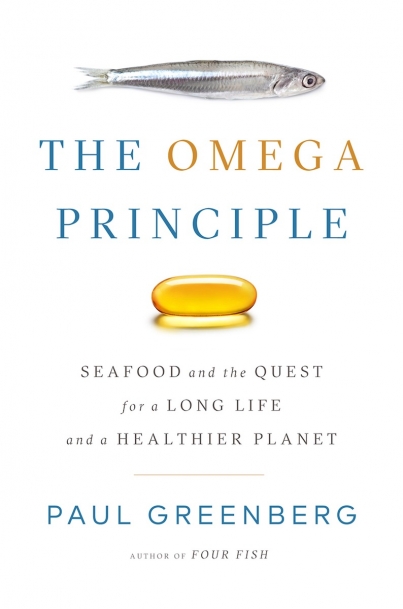The Omega Principle: Seafood and the Quest for a Long Life and a Healthier Planet
This provocative book is much more than a study of gelatinous supplements that purport to solve life’s ills. It is at once a search for a grail (longevity) and a crafty polemic for seafood: Eating more fish benefits people, the planet and especially sustains small fish that bigger fish (the kind we eat) need to thrive.
Little fish have few champions. And taking Omega-3 supplements has many. How we ingest them—from fish or pill—is one of the book’s themes. Greenberg begins his task by taking on just how important and useful Omega-3s are. As his journey to understand the what, why and how of Omega-3s leads him to “Chesapeake Bay menhaden, Peruvian anchoveta, Antarctica krill,” he dubs these the “raw material of a multibillion-dollar industry” that boils down these tiny creatures into “fertilizer, animal feed and dietary supplements.”
These tiny creatures are critical to the diets of the fish we humans dine on. When they are harvested for supplements, we both lose. Back on land, Greenberg confronts another problem in the American diet. He identifies three major culprits in what he calls “the over production of commodity-crop-centered foods” and he names names: corn, soy and wheat. What could be wrong? Our eating patterns, for starters. The top 10 “sources of calories” in the American diet—grainbased desserts, yeast breads, chicken, soda, pizza, booze, pasta, Mexican dishes, beef, dairy desserts—produce problems. The battle pits healthier Omega-3-leaning nutrient-rich foods against Omega-6-leaning commodity foods and comes down to “oversupply” of carbs and “empty calories.” The result is often obesity.
Equally sad, the commodity behemoths’ runoff causes “dead zones” in our oceans. He rails against the millions of acres dedicated to two crops creating the monoculture of soy and corn and reveals their effects on the Mississippi River and the Gulf of Mexico, on fish and our landmass. Greenberg does offer a way forward in part by looking back: “In the beginning we ate wild game, leafy greens and seafood.” And he is most positive about various experiments with bivalves that will return diners to seafood; oysters, clams and mussels are being raised to purify waterways and provide nourishment. Aquaculture is on the rise.
During the course of his research, Greenberg meets algae probers, ice core drillers, river monitors, biotech synthesizers and aquaculture enthusiasts who help him make his most enduring argument: to create a food system that “could promote longer, healthier human lives.” He leaves the reader with a long set of suggestions. Here are a few that almost anyone could incorporate:
• Eat a more Mediterranean-style fish-centered diet.
• Get Omega-3s from food, not pills.
• If you take supplements, use the kind not derived from fish.
• Dine sparingly on land-based animals and then only on grass-fed.
Much to cogitate on and consider in this thoughtful book. It just might cause you to examine your assumptions about food from the land and from the water.
Paul Greenberg | @4fishgreenberg
The Omega Principle: Seafood and the Quest for a Long Life and a Healthier Planet






